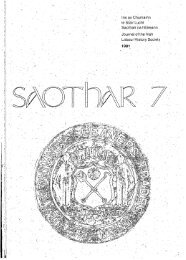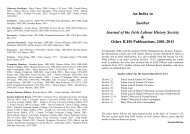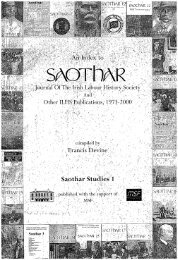106 SAOTHAR 13Railway (Ireland) Sick Fund (1887) and Midland Great Western Railway of Ireland Benefit Society(1883) (Ref. MSS.127/NU/5/5ntl). Rules of Irish Railway Workers' Trade Uriiori (1910) (Ref.MSS.127 /NU/5/5/6/l-111). Great Northern Railway (Ireland) wage~ and hours arbitration: volumecontaining applications from the workforce, evidence submitted, proceedings of arbitration and awardof arbiter, 1911 (Ref. MSS.127/NU/MVl/l/14). National Union of Railwaymen files re the withdrawalof the union from Ireland and the creation of the National Association of Transport Employees, 1940-56 (Ref. MSS.127/NU/OR/3/56-96).White Collar WorkersAssociation of Supervisory Staffs, Executives and Technicians (from 1967 Association of Scientific,Technical and Managerial Staffs) Number 10 Divisional Council ~orthern Ireland, later Ireland as awhole): duplicated minutes, 1960-72 (Ref. MSS.79/AS/l/23/57-63).WoodworkersBelfast. Journeymen Cabinet Makers of Belfast: 1 volume containing rules, minutes and membershiplist, 1788-1830 (Ref. MSS.78/TC/Bel/l/l).Belfast Branch of Friendly Society of Operative Cabinet Makers: 2 volumes containing minutes, 1873-85 (Ref. MSS.78/TC/Bel/l/2-3).Belfast Cabinet Makers' piece price lists, 1922-36 and n.d., (Ref. MSS78/TC/Bel/7/l-4).Belfast 6th Branch of Amalgamated Society of Carpenters and Joiners: 1 volume containing minutes,1892-9.Cork. Cork Coachmakers' Friendly Society: 2 volumes containing rules and records of contributionspaid, 1812-24 (Ref. MSSI26NB/6/BR/CO).Dublin. Reg!llar Carpenters of the City of Dublin: Rules (1881) (Ref. MSS.78/ASW/6jDub/l) andphotographs of the Carpenters' funeral bier'and Carpenters Hall (taken in the 1930s) (Ref. MSS.78/ASW/7/3-4).Dublin Managing Committee of the Amalgamated Society of Carpenters and Joiners: 1 volumecontaining minutes the Managing Committee, 1884-90 and of the United Trades Committee, 1890(Ref. MSS.78/ASC & J/6/1/6).Important and impressive as some ofthe items highlighted above may be, there is a far greater wealthof information about Irish labour history to be found in records which form an integral part of the HeadOffice archives of certain British trade unions. A good deal of patience and a considerable backgroundknowledge may be needed before apparently routine conference proceedings, annual reports, committeeminutes, correspondence, etc., will yield up their"Irish content. Nevertheless it is there, especiallyin respect of unions which had a substantial Irish membership. These include the railwaymen's,printers', bricklayers', stonemasons', carpenters, and engineering unions.In addition to the holdings of the MRC (most of which are on loan from trade unions) the Libraryof the University also possesses fine collections of trade uriion publications. Among these is the libraryof the Labour Department of the Board of Trade. This was donated to the University of WarwickLibrary by the present -day successor of the Board, the Department of Employment. The Board of Tradecollection contains a great many annual and other reports of trade unions and the following TradesCouncil annual reports: Belfast (1892-6,1898-1900,1904-5), Cork (1893-6), Dublin (1892/3-1894/5,1898/9, 1900/1-1903/4, 1906), Limerick (1893/.4",1896) and Londonderry (1903-6).It is probably also worth mentioning that the MRC holds some records relating to the activities ofsmall marxist organisations in Ireland. Further information about these can be obtained from theCentre's publictions.Alistair G. Tough
SOURCES 107NorthWest Archives and Labour History Project40,Shipquay Street. Derry. Telephone: 260630. Open 9-5. Monday to Friday. Director: DessieBaker.The North-West Archives and Labour History Project was setup in January 1986. The project issponsored by the Irish Labour History Society and funded by the Department of Economic Development.The two-fold purpose behind it's inception being to create an archive facility in the North-Westarea accessible to the public, and to carry out much needed research on the neglected subject of labourhistory·. . .. '. .The initial task was to find out what exactly was available in the way of relevant archive materialin our local area, which proved to be practically nil. There is no public record office in the Derry area,so we decided to employ a researcher to work solely in the Public Record Office of Northern Ireland(pRONI) in Belfast, to seek out all references to Derry and the North-West. The result of this was thatwe were able to computerise some 600 plus source records of a general nature, (from a photographiccopy of a drawing of Derry circa 1600, to papers relating to Derry Nationalist Party in 1970) and toprepare for computerisation hundreds more, covering such topics as school records, transportations toAustralia, Stormont Papers and Hansard Reports. We also transcribed the microfilmed OrdnanceSurvey Memoirs for the large parish of Clondermot, which we found to be a valuable source of social,economic and historical data.Computer print-outs of the material so far processed provide in chronological order a briefdescription of the contents of the material, the title and volume numbers of the collection/s from whichthe material comes and the references number/s: thus producing a free, easily readable and conciseguide to the material available. The print-outs have been given to the local libraries and other centresthroughout the area.The history of Derry as a major port and shipbuilding 'centre was another area which warranteddetailed research, for which we employed some of the documentary sources already gleaned fromPRONI, combined with new material from the local Customs House records which supplied us withdetails of the ships which called at Derry, cargoes, tonnages, etc. From this material we were able tocompile a computerised list of all ships registered in Derry from the mid-nineteenth century up untilthe run-down of the port, with owners' names, where the vessels were built and their type. Runningparallel with this documentary history of the port we began an oral history of work at the Derry docks,. relying heavily on the memories of retired dockers who recalled vividly the adverse workingconditions, the complicated 'button system', the berthing of captured German submarines duringWorld War II, along with the songs, myths and customs peculiar to their work, as well as therecollections of those who worked there in a 'white collar' capaCity.Another important topic covered by the oral history project is the genesis of the 'Troubles' in Derry.People who were involved in the Derry Housing Action Committee in the mid~sixties, who protestedagainst American involvement in Vietnam, who defended tenarits against eviction and who wereinvolved in the embryonic Civil Rights' Movement in Derry were interviewed. There are vivideyewitness accounts of the first Civil Rights march in Derry on 5 October, 1968, Bloody Sunday inJanuary 1972, and life in Crumlin Prison as a result of political activity. All aspects of the upsurge ofstreet protest leading up to the resurgence of the present IRA campaign are recalled.We received a request to carry out research regarding the history of May Day in Derry.Unfortunately we were unable to acquire the records of Derry Trades Council, which would of coursehave been invaluable, and so had to rely on contemporary newspaper reports in the local press, madeavailable to us on microfilm by the local library. Although only twenty demonstrations are reported(from the first May Day labour demonstration in 1892 to the mid 1970s) there is quite detailed reportageof the unions invol ved, the local marching bands who participated and vertabim reports of the speeches
- Page 1 and 2:
JOURNAL OF THE IRISH LABOUR HISTORY
- Page 3 and 4:
ContentsPageEditorial: Labour Histo
- Page 5 and 6:
EDITORIAL 3freedom to participate i
- Page 7 and 8:
CorrespondenceThe Irish Labour Part
- Page 9 and 10:
; ~ ; ,The Decline and Fall of Donn
- Page 11 and 12:
THE DECLINE AND FALL OF DONNYBROOK
- Page 13 and 14:
THE DECLINE AND FALL OF DONNYBROOK
- Page 15 and 16:
·' THE DECLINE AND FALL OF DONNYBR
- Page 17 and 18:
THE DECLINE AND FALL OF DONNYBROOK
- Page 19 and 20:
THE DECLINE AND FALL OF DONNYBROOK
- Page 21 and 22:
THE DECLINE AND FALL OF DONNYBROOK
- Page 23 and 24:
THE DECLINE AND FALL OF DONNYBROOK
- Page 25 and 26:
,'-,;-''''.A PASSAGE TO BRITAIN 23C
- Page 27 and 28:
A PASSAGE TO BRITAIN 25only in the
- Page 29 and 30:
A PASSAGE TO BRITAIN 27clothing._De
- Page 31 and 32:
A PASSAGE TO BRITAIN 29established
- Page 33 and 34:
;:-.",.- .. .", ...... '.:. '
- Page 35 and 36:
LOUIE BENNETI 33feminist movement w
- Page 37 and 38:
:... ~: ."
- Page 39 and 40:
-.- '.LOUlE BENNETT 37While there i
- Page 41 and 42:
LOUIE ~ENNEIT 39Xl's encyclical Qua
- Page 43 and 44:
LOUIE BENNEIT 41Bennett's own relat
- Page 45 and 46:
LODIE BENNETT 43109; IWWU resolutio
- Page 47 and 48:
Essays in ReviewCosherers, Wanderer
- Page 49 and 50:
••• .".'. >. '~"ESSA YS IN RE
- Page 51 and 52:
ESSAYS IN REVIEW 49ConnolIy:Myth an
- Page 53 and 54:
ESSAYS IN ~EVIEW 51tion' in the Int
- Page 55 and 56:
ESSAYS IN REVIEW53International:'I
- Page 57 and 58: REVIEWScontroversy is real history.
- Page 59 and 60: REVIEWSJoe Monks was among the earl
- Page 61 and 62: REVIEWSnolly-Column Song','Proudly
- Page 63 and 64: REVIEWSresulting from the arrival o
- Page 65 and 66: REVIEWS,63the book by means of an a
- Page 67 and 68: REVIEWSlogue, it is hardly surprisi
- Page 69 and 70: The Team For All Workers ...CULIAIB
- Page 71 and 72: ESSAYS 69mission and moral refonn.l
- Page 73 and 74: .. ...... ~.~ -~ .'- '.ESSAYS. 71fr
- Page 75 and 76: ESSAYS 73claimed authority but whic
- Page 77 and 78: ESSAYS 75provided the basis for soc
- Page 79 and 80: ESSAYS 779. For comparisons see E.T
- Page 81 and 82: ESSAYS 7952. Annals of Christ Churc
- Page 83 and 84: ESSAYS' 81Fianna Fail and the Worki
- Page 85 and 86: ESSAYS 83Eireann in 1925 visibly di
- Page 87 and 88: ESSAYS 85recognition of the impract
- Page 89 and 90: ESSAYS 871970, it created the condi
- Page 91 and 92: ESSAYS89The Irish Immigrants' Contr
- Page 93 and 94: ESSAYS" 91Although anti -Catholic p
- Page 95 and 96: ESSAYS 93McCowie played a key role
- Page 97 and 98: :. -,,'.' ',. .~.,:.ESSAYS 95Althou
- Page 99 and 100: ESSAYS 97young girl of their own ba
- Page 101 and 102: SourcesIrish Labour History Society
- Page 103 and 104: SOURCES 101INovember, 1971 to no. 1
- Page 105 and 106: SOURCES 103would claim credit for t
- Page 107: SOURCES105Sources for Irish Labour
- Page 111 and 112: SOURCES 109In 1966 the Finnish gove
- Page 113 and 114: TURNINGANEWLEAFThe CPSSUis the larg
- Page 115 and 116: REMINISCENCE 113us due to my politi
- Page 117 and 118: REMINISCENCE 115when Jim was presen
- Page 119 and 120: REMINISCENCE 117of Dail Eireann. 17
- Page 121 and 122: REMINISCENCE 119NotesThe above arti
- Page 123 and 124: DOCUMENT STUDY 121James Connolly in
- Page 125 and 126: DOCUMENT STUDY123SOCIAL DEMOCRATIC
- Page 127 and 128: DOCUMENT STUDY 125proletariat of th
- Page 129 and 130: DOCUMENT STUDY 127the support of Je
- Page 131 and 132: DOCUMENT STUDY 12926. The Workers'
- Page 133 and 134: 131BibliographyA Bibliography of Ir
- Page 135 and 136: BIBLIOGRAPHY 133Compton, P.A. Demog
- Page 137 and 138: BIBLIOGRAPHY 135Levine, I. and Madd
- Page 139 and 140: BIBLIOGRAPHY 137Turner, M. 'Towards
- Page 141 and 142: BIBLIOGRAPHY 1394. Land and Agricul
- Page 143 and 144: BIBLIOGRAPHY 141Clogher Record12 (2
- Page 145 and 146: BIBLIOGRAPHY 143Political Research
- Page 147 and 148: BIBLIOGRAPHY 145Pres, 1987.O'Brien,
- Page 149 and 150: 147Notes on Contributorsf onathanBe
- Page 151 and 152: 1901: Ireland's first general union
- Page 153 and 154: ELECTRICAL TRADES UNION .Establishe





